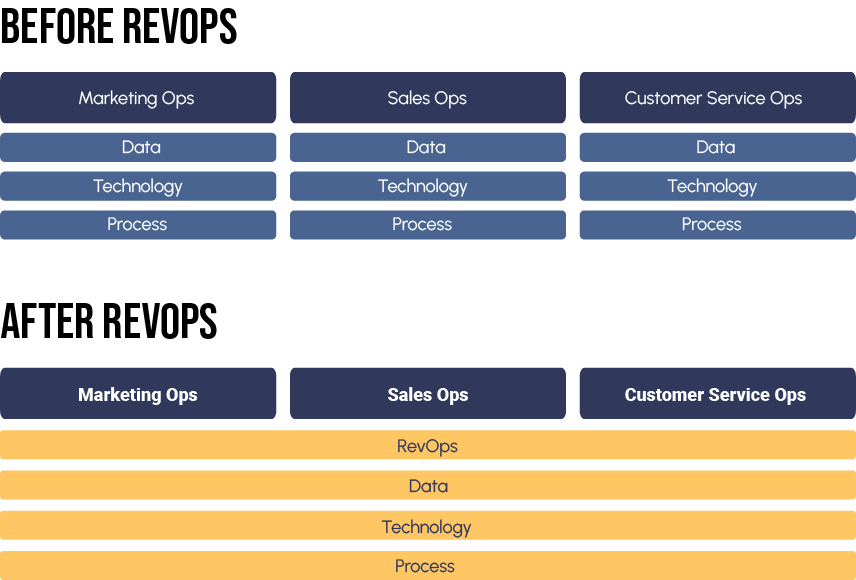April 12, 2024 Maximizing Revenue Growth: The Strategic Advantage of RevOps
In the fast-paced and interconnected world of modern business, organizations are constantly seeking innovative ways to not only grow their revenue but also enhance customer satisfaction and loyalty. This is where Revenue Operations, or RevOps, steps in as a transformative strategy, rapidly becoming the backbone of successful organizations.
At its core, RevOps is an integral approach designed to break down the silos between Marketing, Sales, and Customer Success teams. Historically, these departments have operated independently, guided by their own strategies, goals, and metrics. While such an arrangement sufficed in the past, the digital age demands a more integrated and agile approach to managing and growing revenue streams.
RevOps emerges as this strategic framework, connecting technology, processes, and strategy across these crucial business functions. Its goal is ambitious yet straightforward: to create a frictionless revenue-generating machine that delights customers at every touchpoint. By aligning the objectives and actions of Marketing, Sales, and Customer Success under a unified vision, RevOps enables a seamless flow of data and insights, ensuring that each department contributes optimally to the organization's growth.
But why is this alignment necessary?
In a marketplace where customer expectations are higher than ever, the ability of an organization to deliver a consistent, personalized, and high-quality experience across all stages of the customer journey is paramount. Misalignment between the departments responsible for attracting, converting, and retaining customers can lead to missed opportunities, inefficient use of resources, and a disjointed customer experience. This not only impacts revenue growth but can also harm brand reputation and customer loyalty in the long run.
Furthermore, the integration of technology, processes, and strategy facilitated by RevOps provides organizations with a more granular and accurate understanding of their operations and customer interactions. This data-driven insight allows for more informed decision-making, better strategy formulation, and identifying areas for improvement. For example, organizations operating in a siloed model focus rarely unify customer support with marketing and sales even though customer evangelists help convert sales at 3x the rate of businesses who aren’t engaging existing customers to help sell.
The traditional business model, characterized by its departmental silos, presents a significant array of challenges that can stifle an organization's growth and hamper its operational efficiency. This segmented approach, where Marketing, Sales, and Customer Success functions operate independently, often leads to a disjointed strategy that negatively impacts the customer experience and, ultimately, sales conversions.
Challenges with the Traditional Model
One of the primary challenges with this model is the creation of disparate systems within the organization. Each department tends to adopt its own tools and software solutions tailored to its specific needs without considering the broader organizational impact. This can lead to significant integration issues, where data does not flow seamlessly between systems, making it difficult to obtain a unified view of the customer journey, or accurately measure Customer Lifetime Value, Sales & Marketing SLA compliance, customer success metrics and more. opportunities for cross-functional collaboration and strategic alignment are missed, and the organization loses out on critical insights that could drive revenue growth.
Insights gained from customer interactions may not be shared effectively across departments, leading to a slower response to market changes, customer needs, and competitive threats. This lack of agility and responsiveness can put the organization at a significant disadvantage in today's fast-paced market environment.
From a sales and marketing perspective, aligning customer support with sales and marketing is a critical component in defining and understanding the ideal customer profile for a business. This integration provides invaluable insights into customer preferences, behaviors, and pain points, directly informing both marketing and sales strategies. Customer support interactions offer a wealth of data about customer experiences, challenges, and feedback post-purchase, which can be used to refine target personas.
Sales teams benefit from this information by gaining a deeper understanding of who the best-fit customers are, thus enabling them to tailor their sales approach and prioritize leads more effectively. Similarly, marketing teams can leverage these insights to craft more resonant messaging and targeted campaigns, attracting prospects who are more likely to convert and become loyal customers.
From a customer support perspective, a potential customer might receive mixed messages from marketing and sales, or customer service may not have access to the full history of the customer's interactions with the company. These friction points not only diminish the quality of customer engagement but also increase the likelihood of lost sales conversions, as potential buyers become frustrated with a disjointed experience and turn to competitors offering a more cohesive journey.

When RevOps becomes an integral part of a business's go-to-market strategy, it simplifies the process of viewing sales, marketing, and customer success not as separate entities but as cohesive components of a single function.
The six key pillars of RevOps
Diving deeper into the essence of Revenue Operations (RevOps) and its impact on businesses, understanding the foundational pillars that underpin RevOps is crucial. These elements transform RevOps from a mere concept to a practical, actionable strategy, ensuring its success and sustainability.
Data- Ensure data health through cleanliness, accuracy, and consistency across platforms and departments.
- Establish a robust data infrastructure for seamless data flow and storage.
- Manage data with a focus on governance, compliance, and security.
- Emphasize data stewardship, encouraging diligent management by all team members.
- Map the entire customer journey from initial contact to post-sale support.
- Streamline the sales process for efficiency.
- Strategically segment the customer base for better targeting.
- Employ regular assessments like Quarterly Business Reviews (QBRs) to gauge performance, renewal opportunities, and potential for account expansion.
- Measure success through Key Performance Indicators reflecting business development, pipeline management, and performance.
- Focus strategies on business development and pipeline management.
- Forecast future performance for strategic planning.
- Concentrate on account retention and expansion and continuously analyze sales activities to enhance strategies.
- Leverage technology for growth by carefully evaluating and selecting technologies that align with business goals.
- Manage and integrate these technologies to support RevOps goals effectively.
- Maximize technology utilization to enhance efficiency, collaboration, and customer engagement.
- Focus on building a skilled team through continuous learning and development.
- Provide regular training and coaching to equip the team with necessary skills.
- Streamline the onboarding process for new hires to quickly integrate them into the company's culture and processes.
- Drive the RevOps strategy forward with clear, measurable goals that align with the company's vision.
- Identify and prioritize target accounts with high revenue potential.
- Analyze historical data to identify "best deals" and market opportunities for expansion.
Together, these pillars form the foundation of a successful RevOps strategy, enabling businesses to not only align their efforts across departments but also position themselves for sustainable growth and success in a competitive landscape.
Future of RevOps
The future of Revenue Operations (RevOps) is set to be revolutionized by the integration of advanced technologies such as Artificial Intelligence (AI) and automation. These technologies are more than just supplementary enhancements; they are pivotal in transforming how RevOps strategies are designed and implemented. This evolution is particularly evident in the realm of customer experiences, which are becoming increasingly integrated and seamless thanks to these technological advancements.
As companies adopt automation and AI, the necessity for a comprehensive RevOps approach becomes more apparent. These technologies require organizations to further embrace RevOps to ensure that customer interactions are not only efficient but also personalized and predictive. The ability to harness data from across the customer journey and apply insights in real time will enable businesses to anticipate customer needs, tailor experiences, and engage customers more effectively than ever before.
This level of insight enables Marketing, Sales, and Customer Success teams to make data-driven decisions quickly and accurately, aligning their efforts more effectively and pushing the boundaries of what they can achieve. Moreover, automation technology is streamlining repetitive and time-consuming tasks that often bog down these teams. From automated lead scoring and nurturing campaigns to customer service inquiries and feedback collection, automation ensures that these critical but resource-intensive activities are handled efficiently, allowing teams to focus on more strategic initiatives. This not only boosts productivity but also enhances the customer experience by providing timely, personalized interactions.
As RevOps continues to evolve, integrating AI and automation will facilitate a more proactive approach to revenue generation and customer relationship management. Businesses will be able to anticipate customer needs and market shifts more accurately, positioning themselves as agile competitors in their respective industries. The future of RevOps, therefore, lies in its ability to harness these technologies to create a seamless, efficient, and highly responsive operational framework that drives growth and fosters customer loyalty.
Conclusion
Embracing the RevOps model marks a significant shift in how businesses align their sales, marketing, and customer support efforts towards a singular goal of maximizing revenue and enhancing customer experiences. Implementing an effective RevOps strategy, however, can be intricate, requiring a nuanced understanding of different business functions and their interplay. This is where the expertise of a trusted agency becomes invaluable.
Partnering with a specialized agency such as SEO Fundamentals to implement or manage a RevOps strategy brings several benefits. First, we possess the expertise and experience needed to navigate the complexities of integrating various operational functions seamlessly. They can effectively identify and bridge gaps in current processes, ensuring a smooth transition to the RevOps model.
Moreover, SEO Fundamentals brings proven methodologies, advanced tools, and best practices honed through diverse client experiences to the table. This wealth of knowledge allows for the deployment of tailored strategies that suit specific business needs and market dynamics.
Finally, ongoing management and optimization support ensures your RevOps strategy remains dynamic and adaptable to changing market conditions and business goals. They provide continual support, analytics, and strategy refinements, driving sustained revenue growth and customer satisfaction.
In essence, while the transition to a RevOps framework signifies a progressive step for businesses in today’s competitive landscape, the role of a skilled agency in this transformation cannot be understated. Their expertise not only aids in a smoother and quicker implementation but also ensures the long-term effectiveness and scalability of RevOps strategies, setting businesses on a path to sustained success and growth.
READY TO TRANSFORM YOUR BUSINESS?
Book a Free Consultation & Learn how we can help your business grow.
Desireé Solís
Skilled content marketing expert with four years of experience, specializing in impactful, innovative strategies that boost brand visibility and engagement. Her expertise spans content creation, brand strategy, storytelling, and social media marketing. Renowned for her versatility, Desireé adeptly tailors her approach to meet various brand challenges and goals, showcasing an exceptional ability to adapt and excel across different marketing landscapes.

